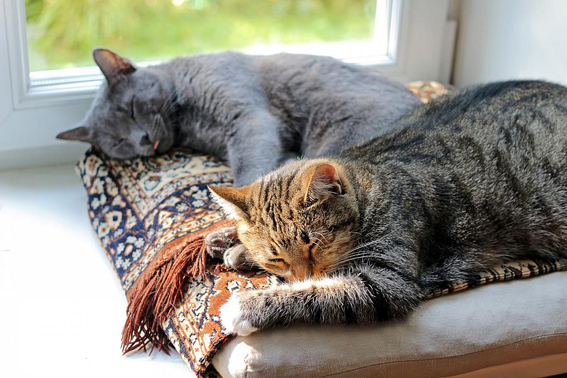STERILIZATION AND OUR CAT. CHANGE THE CHARACTER?
- Details
- Category: Feline news
- Hits: 470

With the neutering our cat will have character changes due to the hormonal changes that the neutering will bring.
These behavioral changes will take place gradually over time and not overnight. In fact, by eliminating heat cycles and the instinct to mate, cats will tend to move away less, will be less active and will tend to gain weight. It is important, to keep our cat at its ideal weight, to feed it with a correct diet. We can find on the market many high quality foods specific for sterilized cats or we can contact a veterinarian / nutritionist who prepares our cat a specific personalized diet with fresh food. We focus on the quality of the food to prevent the cat from gaining too much weight and getting sick. In the long run, a low quality food leads the cat to numerous diseases that can be very serious. Let's not leave the food available for the whole day but be careful about the portion size.
We can also stimulate them to move more by tempting them with the game by enriching the surrounding environment with gyms for climbing, climbing, jumping, scratching, special games. An excellent idea is to adopt two cats so they are encouraged to play together. An only child cat would suffer from loneliness and become lazy.
The sterilized cat will no longer have those typical vocalizations of heat, will not be nervous during the heat and will no longer be influenced by hormones. But let's see together what will be the most important changes that will occur:
- Fortunately, male cats will no longer wander off in search of a female to mate with. Both cats and female cats will reduce the outputs and the size of their territory.
- It will reduce or eliminate the annoying urinary marking (in some cats, but it is rare, unfortunately the marking may persist).
- He will no longer fight with other males for the conquest of females, thus avoiding more or less deep wounds with the possibility of developing abscesses and infections.
-He will avoid being infected by sick cats or cats that can transmit sexually transmitted diseases to him.
Sterilization is essential for our friends.
It is for a very important series of reasons. Let's see together which ones:
1) Prevent litters
2) Avoid contracting sexually transmitted diseases such as FIV (FELINE AIDS) and FeLV (FELINE LEUKEMIA).
3) Avoid aggression due to competitions between males
4) Avoid cat vocalizations typical of cats in heat
5) Avoid Irritability due to hormonal changes
6) Avoid frequent urine staining of unsterilized cats
7) Prevent them from straying too far from home and putting themselves in danger.
8) Unsterilized cats have a higher risk of getting breast and uterine cancer.
After being neutered, our cats must recover from the operation and may be less active and have less appetite for two or three days, before returning to normal. Surely the first hours after sterilization will be stunned and disoriented by the anesthesia. I recommend keeping them closed in a small quiet environment (even a pet carrier) and with a litter box, where they cannot get injured by bumping into them because they stagger. Do not give food and water until you see your cat completely returned to normal, even the internal organs must resume normal digestion.
What to check:
What to check:
1) The incision: check that it is always clean and intact, that there is no redness, swelling and infiltration of liquids and probable infections and establish a check with the veterinarian to schedule the date to remove the stitches, if they are not those that are reabsorbed by themselves. If the cat has excessively licked the incision, the possibility of developing an infection is high. Contact your vet an
2) Appetite: if the cat has a poor appetite for more than two days after being sterilized, the veterinarian should be contacted.
3) If he sleeps too much, if he is lethargic even after a few days after the operation.
4) If you notice strange changes in behavior.
When does the first heat appear?
The cats will go into heat at about 5/6 months of age and the males at about 8-9 months of age. Cats can go into heat at any time of the year, but mainly during spring, summer and before the end of autumn because the temperature is excellent and it is the ideal climate for the kittens to grow.
Heat in cats can last up to two weeks in heat. This hormonal activity affects the well-being of the cat who often does not eat, does not sleep and in addition the continuous heat during












